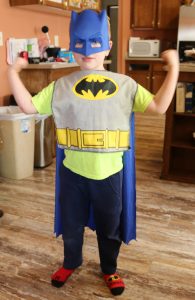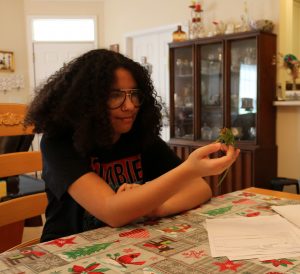In-Home Therapy Helps Children Overcome Mental Health Struggles

In-home therapy can be a life-changing, critical intervention for children trying to overcome the effects of traumatic life events such as the death of a loved one, abuse or watching a family member struggle with substance use.
For such children, Monarch’s In-Home Therapy Services (IHTS) can be a lifesaving bridge to becoming mentally healthy.
IHTS provides treatment and case management for at-risk children, ages 3-21, on the brink of being removed and placed outside of the home. Therapists who make up the IHTS team aim at providing therapy that can serve as hope.
During in-home visits, the therapist works to manage the child’s behavior following a diagnosis of a serious mental illness that makes it difficult to pursue traditional, office-based outpatient care. After the child’s initial assessment and once a crisis plan is in place, IHTS typically lasts six months, with the child stepping down to receive behavioral health outpatient services toward the conclusion of treatment.
Three teams deliver Monarch’s IHTS which can accommodate a total of 36 families covering Stanly, Rowan, Davidson, Cabarrus, Mecklenburg and Union counties under the auspices of Cardinal Innovations Healthcare, the managed care organization for those counties.
A full-time team leader and a part-time qualified professional (QP) make up each team. Fellow IHTS team members include Team Leader Melissa Barbee and administrative and organizational support provided by Qualified Professionals Hanna Bundy and Marva McCain.
Monarch also provides Intensive In-Home Service (IIHS), similar to IHTS, available for children with profound mental health issues who require the availability of around-the-clock crisis assistance.
IHTS Team Leader Melissa Barbee, MS, LPC, a licensed professional counselor, views the initial step as one of building trust, regardless of the child’s mental health diagnosis.
“I work with my kids to help them understand the process of therapy and what they can expect during in-home therapy sessions,” explained Barbee. “When we first meet, I try to answer any questions and concerns they might have and assure them that what we talk about is confidential.”
In-home therapists travel days are hectic, driving to and from each location, providing therapeutic services and linking families with critical community resources. While traveling, therapists are often fielding phone calls from families, the qualified professionals who support the team and mentally preparing for the next visit.
 Barbee said the most rewarding part of her role as a therapist is to see children reach goals established at the beginning of treatment. “It is also rewarding to be able to be an encouraging person for an individual when they are at a point in life in which they are struggling,” she said.
Barbee said the most rewarding part of her role as a therapist is to see children reach goals established at the beginning of treatment. “It is also rewarding to be able to be an encouraging person for an individual when they are at a point in life in which they are struggling,” she said.
At times, it is challenging for a therapist to see a child or family at their lowest point battling depression, anxiety, stress, grief or trauma, Barbee noted, adding that working as a team allows her to seek suggestions or ideas from the other therapists.
Barbee, who joined Monarch in 2011, has worked on the IIHTS team and in outpatient services. She enjoys working with children and has even dressed the part of a Ghostbusters character during a therapy session.
“I try to come up with games and art activities that connect to their interests. If I can identify their interests and connect it to what we are discussing, then they are more likely to remember,” she noted.
No day is ever the same and the children can be full of surprises, Barbee described: “They definitely keep me on my toes, which might be one of the reasons I love working with children.”
Photo Captions:
(Top photo) Joey tries out his favorite super hero costume during a therapy session.
(Bottom photo) Jayden holds her pet lizard and likes the calmness she feels when she holds her pet reptiles during a therapy session. She also has a pet ball snake and chameleon.
Posted on: Tuesday July 9, 2019
